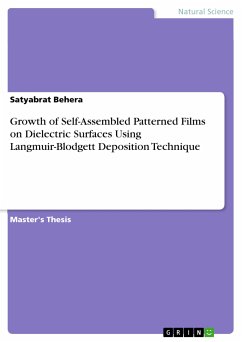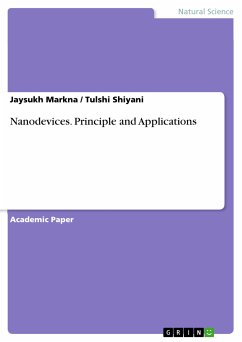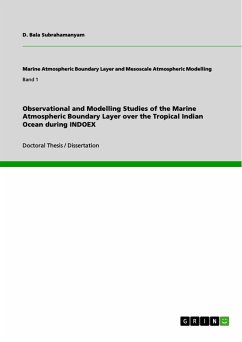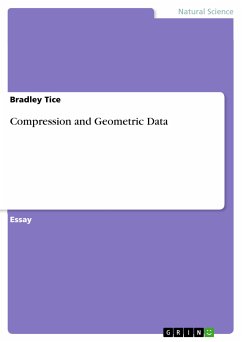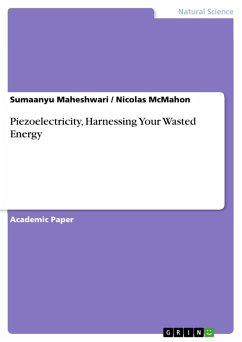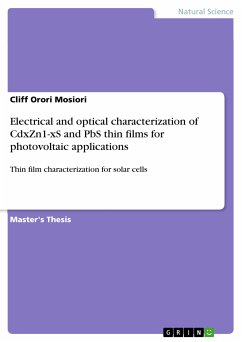
Electrical and optical characterization of CdxZn1-xS and PbS thin films for photovoltaic applications (eBook, PDF)
Thin film characterization for solar cells
Versandkostenfrei!
Sofort per Download lieferbar
Statt: 47,95 €**
36,99 €
inkl. MwSt. und vom Verlag festgesetzt.
**Preis der gedruckten Ausgabe (Broschiertes Buch)
Weitere Ausgaben:

PAYBACK Punkte
0 °P sammeln!
Master's Thesis from the year 2011 in the subject Physics - Applied physics, grade: A, Kenyatta University, course: Master of Science ( Physics), language: English, abstract: In this research an n-type CdxZn1-xS and p-type PbS thin films were optimised for solar cell applications employing chemical bath deposition technique. The thin films were prepared using thiourea and nitrates of cadmium, zinc and lead. Deposition of optimised CdxZn1-xS was done by CBD at 820 C and in alkaline conditions while that of PbS was done at room temperature and both films at normal atmospheric pressure utilizing ...
Master's Thesis from the year 2011 in the subject Physics - Applied physics, grade: A, Kenyatta University, course: Master of Science ( Physics), language: English, abstract: In this research an n-type CdxZn1-xS and p-type PbS thin films were optimised for solar cell applications employing chemical bath deposition technique. The thin films were prepared using thiourea and nitrates of cadmium, zinc and lead. Deposition of optimised CdxZn1-xS was done by CBD at 820 C and in alkaline conditions while that of PbS was done at room temperature and both films at normal atmospheric pressure utilizing aqueous conditions. This study concentrated on optimising optical and electrical characterization of the films. Optical constant suitable for photovoltaic applications were sort for and for this purpose a UV VIS IR spectrophotometer 3700 DUV was utilised while the electrical properties were investigated using a four point probe connected to a Keithley 2400 source meter interfaced with computer. The optical band gap of the as deposited CdxZn1-xS films varied from 2.47eV (x =0.6) to 2.72 eV (x =1.0), and transmittance above 79% in the VIS - NIR region for the concentration range of x = 0.6 to 1.0, that is, the band gap increased with increasing Zn concentration of the alloy and Cd06Zn0.4S sample showed the widest band gap. It was obtained that the presence of zinc increased optical band gap. The average extinction coefficients for the as deposited CdxZn1-xS samples were very low revealing that they absorb very little radiation hence a good window layer material. As measured by the four point probe connected to a Keithley 2400 source meter, electrical resistivity increased with increase in Zn in the bath in CdxZn1-xS and a resistivity range of 9.5×101 - 1.22× 102 O-cm was obtained. These properties are appropriate for window layers used for photovoltaic cell applications. PbS thin films had a band gap of 0.89 eV and a transmittance of below 55% appropriate for absorber layers of photovoltaic cells and a resistivity range of 6.78 × 103 to 1.26 × 104 O-cm. The fabricated photovoltaic cell had a short circuit current, Isc = 0.031 A, open voltage, Voc = 0.37V, efficiency, ¿ = 0.9% and a fill factor, FF = 0.66 implying that the two materials are appropriate for photovoltaic applications especially in the VIS and IR light spectrum.
Dieser Download kann aus rechtlichen Gründen nur mit Rechnungsadresse in A, B, BG, CY, CZ, D, DK, EW, E, FIN, F, GR, HR, H, IRL, I, LT, L, LR, M, NL, PL, P, R, S, SLO, SK ausgeliefert werden.




